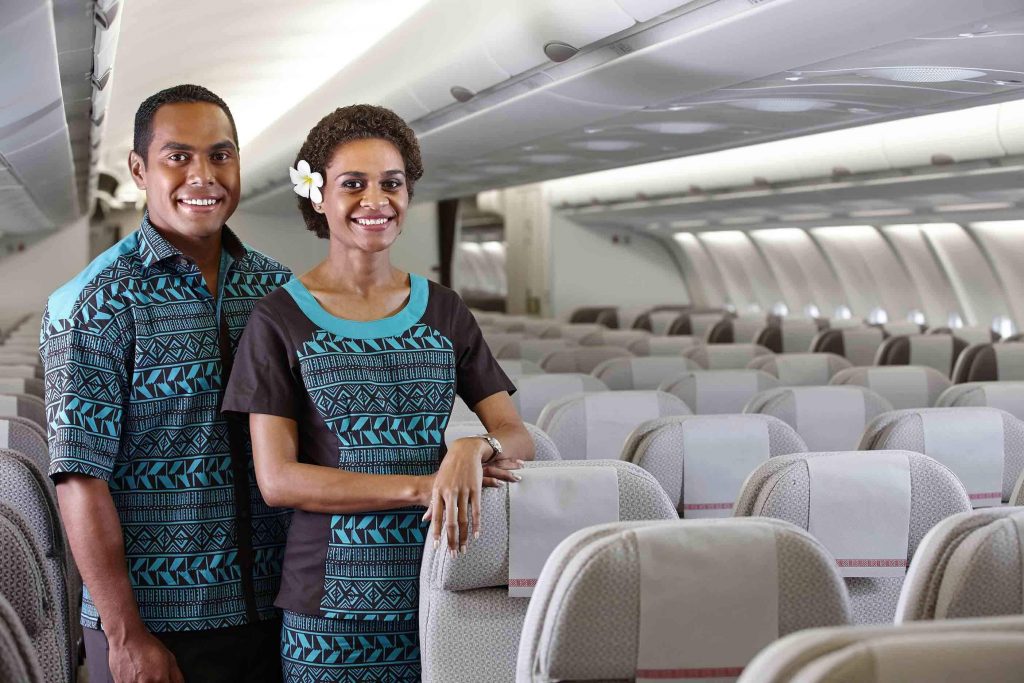Access selected deals available with budget and full-service airlines
Lock any airfare that sounds great. You don’t lose anything if you cancel it
Call us anytime for any assistance. We do not go into hibernation
Your personal and financial information stays secure with us
Fiji Airways, the national airline of Fiji, is a key player in Pacific aviation, operating from its hub at Nadi International Airport (NAN). Founded in 1947 as Katafaga Estates Ltd. by Australian aviator Harold Gatty, it was renamed Fiji Airways in 1951. As a full member of the oneworld Alliance since April 1, 2025, the airline serves 27 destinations across 15 countries, including Australia, New Zealand, the United States, Canada, and Pacific Island nations like Vanuatu and Samoa. Employing over 1,000 staff and generating revenues of FJD$815 million (US$390 million) annually, Fiji Airways brings in 64% of all visitors flying to Fiji, reinforcing its role as the nation’s flagship carrier. Known for its warm Fijian hospitality, modern fleet, and commitment to cultural authenticity, Fiji Airways holds a Skytrax Four-Star rating and was named the Best Airline and Staff in Australia/Pacific in 2023.

Fiji Airways traces its roots to 1947 when Harold Gatty, a renowned navigator who completed a record-breaking round-the-world flight in 1931, established Katafaga Estates Ltd. after settling in Fiji post-World War II. The airline’s first commercial flight, under the Fiji Airways name, took place on September 1, 1951, with a seven-seater de Havilland Dragon Rapide flying from Suva’s Nausori Airport to Drasa Airport near Lautoka. In 1958, Qantas acquired the airline, rebranding it as Air Pacific in 1970 to reflect its regional focus, with shareholders including the governments of Tonga, Samoa, Nauru, Kiribati, and the Solomon Islands by 1966.
The airline expanded internationally with its first flight to Brisbane, Australia, on June 1, 1973, followed by a Honolulu route in 1983 under “Project America.” The 2000 Fijian coup d’état disrupted tourism, forcing Air Pacific to return a leased Boeing 747. In 2006, the airline ordered five Boeing 787-9s, but canceled the order in 2011 due to delivery delays, opting instead for three Airbus A330-200s, the first of which, christened “Island of Taveuni,” flew to Auckland in 2013. That year, under CEO David Pflieger, Air Pacific reverted to the Fiji Airways name to emphasize its national identity, marking a successful turnaround.
During the COVID-19 pandemic, Fiji Airways faced financial strain, with the Fiji National Provident Fund (FNPF) increasing its stake to 30% by purchasing shares from Qantas, reducing Qantas’ ownership to 16%. The Fiji government retains a 52% stake, with Pacific Island nations holding the remainder. In 2024, Fiji Airways launched nonstop routes from Dallas-Fort Worth (DFW) to Nadi and from Nadi to Cairns, Australia, enhancing U.S. and regional connectivity. Joining the oneworld Alliance in 2025 strengthened its global presence, offering passengers access to over 900 destinations and loyalty benefits through programs like American Airlines’ AAdvantage and Qantas Frequent Flyer.
Fiji Airways operates a fleet of 15 aircraft: four Airbus A350-900s, four Airbus A330-200s, one Airbus A330-300, one Boeing 737-800, and five Boeing 737 MAX 8s, with an average fleet age of 7 years. The A350-900s and A330-300s serve long-haul routes to the U.S. (Los Angeles, San Francisco, Dallas, Honolulu), Canada (Vancouver), and Singapore, while the A330-200s and 737 MAX 8s cover Oceania destinations like Sydney, Auckland, and Apia. Its subsidiary, Fiji Link, operates domestic and regional flights with two ATR 72-600s, one ATR 42-600, and three de Havilland Canada DHC-6 Twin Otters, connecting smaller Fijian islands like Taveuni and Savusavu.
The airline operates 108 routes, including daily flights from Los Angeles (LAX), three weekly from San Francisco (SFO) and Honolulu (HNL), and new services to Dallas (DFW, 13 hours). Codeshare agreements with Qantas, American Airlines, Cathay Pacific, Singapore Airlines, and others expand its network, offering seamless connections to Hong Kong, Tokyo, and beyond. Nadi International Airport, the airline’s hub, handles 2.5 million passengers annually, though its facilities are modest, with ongoing upgrades planned. Fiji Airways’ cargo services support Fiji’s export economy, transporting seafood and agricultural goods.